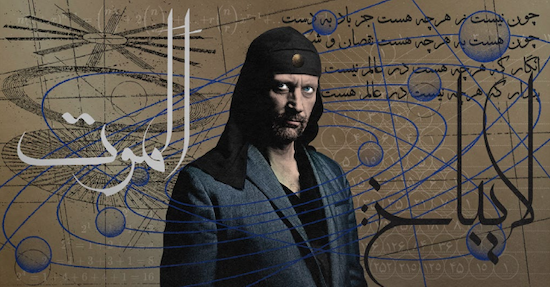Laibach have announced a major new work to be produced in collaboration with a number of Iranian composers.
Called Alamut, it takes as inspiration a story from 11th century Persia, retold by the Slovene writer Vladimir Bartol in a novel published in 1938. The original tale was one of Persian struggle against the Christian Crusader invasions of the medieval period, and was rewritten against the context of resistance to fascism in pre-Second World War Europe.
The music for Alamut has been written by Iranian composers Idin Samimi Mofakham and Nima A. Rowshan, who worked alongside Laibach and Slovene composer Luka Jamnik. Laibach have made three trips to Tehran to work on the piece, involving protracted discussions about peace and art with the Iranian culture ministry. "This is a very difficult project because most of it is based on diplomacy," said Laibach’s Ivan Novak at the London launch of Alamut this morning (July 12). "We have said that art is diplomacy that demands fanaticism, and this is exactly what we are doing. Diplomacy is becoming an important part of our projects nowadays, we live in very complex times".
Alamut will be given its debut at a former Crusader castle in Ljubljana on September 5 and 6, 2022. For the performances, the RTV Slovenia Symphony Orchestra will be joined by the Human-Voice Ensemble vocal group from Tehran, the Gallina Women’s choir, and AccordiOna, a women’s accordion orchestra who will be backed by additional accordion players. As many as 200 musicians will be conducted by Iranian conductor Navid Gohari, and if permission is granted, the plan is then for a performance to take place in Tehran with a local orchestra in 2023.
Giving background to the Alamut story, Laibach and their partners in the a/political organisation issued a statement saying: "The central character is Hassan-i Sabbāh, the charismatic religious and political leader of the Nizari Ismailis and the founder of a mysterious military formation known as the Assassins, whose name is still feared and respected today. Hassan-i Sabbāh is a self-proclaimed prophet who leads a holy war against the Seljuk Empire from his eyrie – the castle of Alamut. Alamut looked at mechanisms of propaganda at the time when Bartol, a Slovenian author, witnessed the rise of Fascism in Trieste, Italy, where he lived."
The band’s Ivan Novak added that in Slovenia, the story became a metaphor for the struggle against fascism. "He wrote this book about events in 11th century Persia, and this is an incredibly strong link, and something that we simply have to do in Tehran and also in Slovenia," he said. "Hassan-i Sabbāh is more alive than ever; he is more relevant than ever. We are generally not interested in only doing tours, we are interested in projects like this, so-called ‘impossible projects’".
Alamut will also be the subject of a documentary by Sašo Podgoršek, who made the 2006 Laibach tour film Divided States Of America.
In Jennifer Lucy Allan’s recent piece about Laibach’s performance in a/political’s Foundry art space in Southern France, Novak spoke about Alamut. Of this exchange, Allen wrote that Novak "says that people they have explained the project to have asked – as they did with North Korea – why Laibach are playing. Are they supporting the regime? No, they’re not supporting the regime, says Novak, but are ‘supporting people who decided to stay in Iran, despite everything’."


